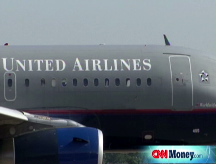Fewer flights, higher fares
As the cost of jet fuel rises, 6 leading airlines cut capacity. More price hikes are announced. 'The question is how high they'll go,' expert says.
NEW YORK (CNNMoney.com) -- As oil prices continue to break records, the nation's six leading airlines have announced capacity cuts for 2008, trimming flights in major hubs and cutting off service to dozens of discount destinations.
All told, the industry will cut capacity by 9% in 2008, according to James Higgins, analyst for Soleil-Solebury Research.
Experts are also expecting more fare increases. Tom Parsons, travel pricing expert at BestFares.com, said airlines have imposed about a dozen fare increases or fuel surcharges since the end of last year.
"I think we'll continue to see fare increases," said Philip Baggaley, fixed income analyst at Standard & Poor's. "The question is how high they'll go."
On Friday, Delta Air Lines, United Airlines and Southwest Airlines all added fare increases, ranging from $5 to $40.
"The goal is to get just the right mix of capacity cuts and higher prices and fees to keep planes packed this fall and winter," Farecompare.com Chief Executive Rick Seaney wrote on his site.
In addition, the industry has added numerous fees for services that were once provided for free, such as American Airlines' newly imposed $15 charge for travelers' first checked bags.
The skyrocketing cost of fuel is the biggest culprit to the money-losing airline industry. Oil prices broke a new record on Friday, rising above $142 a barrel. Fuel expenses are expected to rise to $61.2 billion in 2008, compared to $41.2 billion last year, according to the Air Transport Association. Meanwhile, the Amex Airline Index has plunged more than 50% this year.
In cutting capacity, airlines are targeting their most financially-inefficient flights, and filling their remaining flights to maximum capacity.
In June, the airlines with the most annual sales - including AMR Corp.'s (AMR, Fortune 500) American Airlines, Delta Air Lines (DAL, Fortune 500), UAL Corp.'s (UAUA, Fortune 500) United Airlines, Continental Airlines (CAL, Fortune 500), Northwest Airlines (NWA, Fortune 500) and US Airways (LCC, Fortune 500) - each announced capacity reductions. With the exception of Northwest, all of these airlines provided details of which hubs will be affected and which flights will disappear.
American Airlines was the most recent carrier to detail its cuts.
On Wednesday, American said it would eliminate 189 additional flights by the fourth quarter, with up to a 12% reduction in domestic capacity.
American will no longer fly into Oakland, Calif., London's Stansted airport, and Barranquilla, Colombia. American Eagle, the carrier's shuttle service, is discontinuing service to Albany, N.Y., Harrisburg, Penn., Providence, R.I., and other cities. American is also trimming flights at major hubs, including Chicago, St. Louis and Dallas/Fort Worth.
With other airlines, many of the service cuts are in Florida, a popular destination for discount flyers. These low-cost flights are no longer considered worthwhile for the money-losing carriers.
United said it would no longer offer service to Fort Lauderdale and West Palm Beach.
Delta is also cutting point-to-point service between Orlando and 11 other cities, including Key West and Panama City, both in Florida, and New Orleans. Delta is cutting direct service between Pensacola, Fla. and two other cities in that state - Fort Lauderdale and Tampa, as well as point-to-point flights between Boston and Jacksonville, Fla. The airline said these cities can still be accessed, but only through hubs.
Continental is also trimming Florida service by ending point-to-point flights between Sarasota and three major hubs, and between Houston and Tallahassee.
"I think Florida is at the top of the list [of cuts and potential cuts], and I wouldn't be surprised if we saw more cuts in Las Vegas," said Higgins.
In addition, Delta is eliminating point-to-point flights between Los Angeles and Las Vegas. U.S. Airways also said it is drastically reducing flights to the gambling hub.
Parsons of BestFares.com said that Hawaii is no longer considered a discount destination for West Coast flyers, and that fares have doubled since last year. Also, American Airlines eliminated its Chicago-Honolulu flight, and two of the airlines that used to service Hawaii - Aloha Airlines and ATA - have gone out of business.
"Hawaii is probably taking the biggest beating," said Parsons. "Hawaii is almost being treated like an international destination."
Meanwhile, Southwest Airlines (LUV, Fortune 500) - the only profitable U.S.-based major airline - has increased service, albeit by a small margin. Southwest, which successfully hedged its fuel costs and therefore avoided the current high prices, is using its increase in flights to service areas that have been abandoned by competing carriers.
Southwest said on Thursday that it was cutting 31 flights but adding 40, for a net gain of nine. Southwest is adding flights to the Denver hub, where United Airlines announced cuts, and to Albany, where American Airlines is discontinuing service. Southwest is also adding service to Fort Lauderdale, Fort Myers and Las Vegas.
Also, Southwest is less aggressive in imposing extra fees than many of its competitors. Parsons said that this, combined with Southwest's ability to operate in airports that other airlines have abandoned, increases the airline's ability to compete.
"Southwest may end up being the biggest winner of them all," said Parsons.
The airlines will probably announce the next big wave of capacity cuts next year, said Higgins, who projects that they'll cut capacity in 2009 by the "mid-single digits."
"We're going to have to see what the economy looks like and we're going to have to see what oil prices look like," said Higgins.
But experts said that trying to estimate which hubs and flights are slated for cuts is a tricky business, partly because the airlines base these decisions on complicated hub juggling.
Said Baggaley of Standard & Poor's: "The airlines don't have perfect flexibility to slice off capacity like salami."
Correction: An earlier version of this story incorrectly stated that Delta was ending service to certain airports, when it was actually ending point-to-point service, which means those airports can still be accessed through hubs. ![]()




